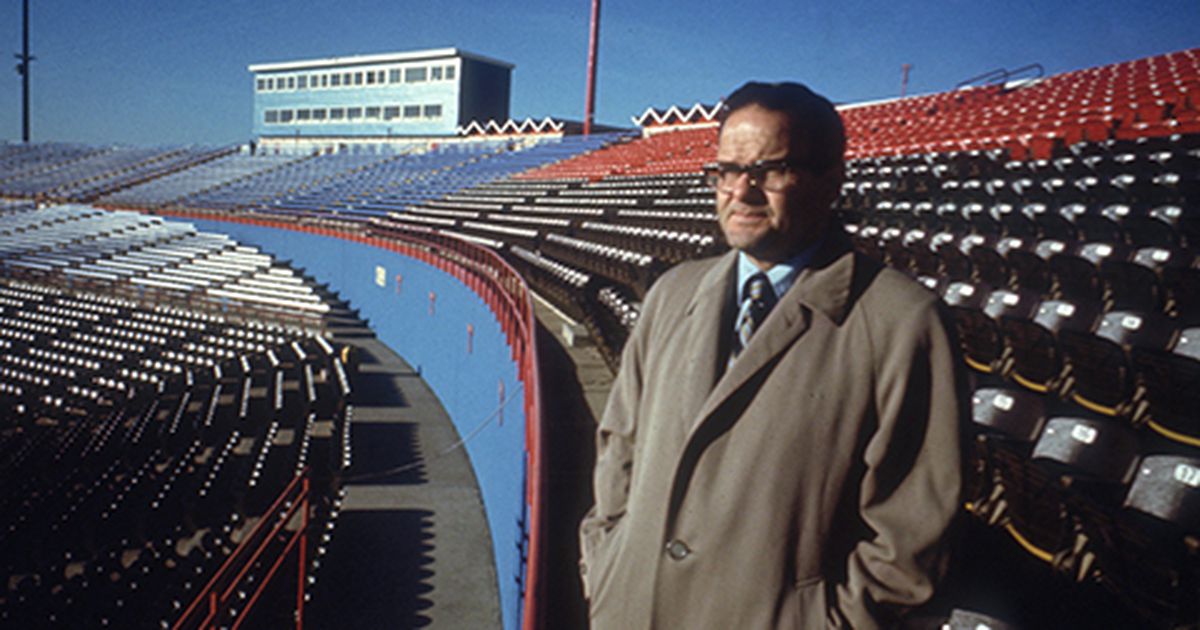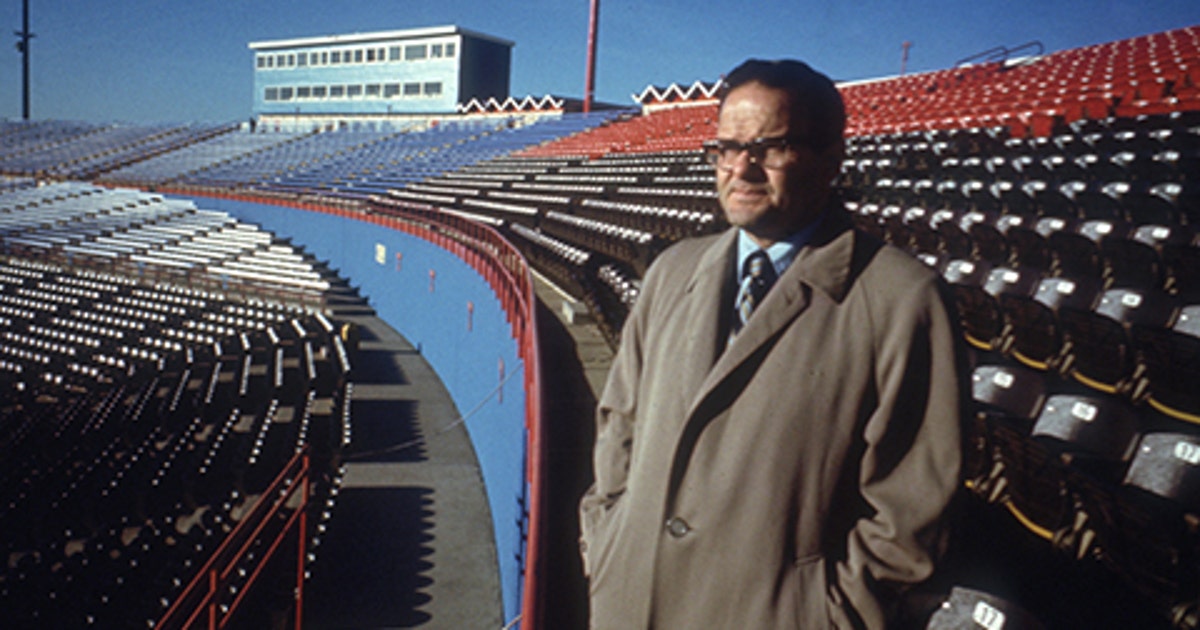Lamar Hunt’s legacy runs through the Chiefs and this Super Bowl


Only a few days have passed since that pair of swashbuckling Sunday performances from the Kansas City Chiefs and the San Francisco 49ers, but already the talk of history in conjunction with this year’s Super Bowl is off the charts.
No surprise there; it has been 50 years since the Chiefs made it to football’s grandest game, while the 49ers have a shot to lift a record-tying sixth Vince Lombardi Trophy. (Relax, Green Bay Packers fans, we know you have the most overall championships.)
Yet the Chiefs have some extra nostalgic bragging rights when it comes to the Super Bowl, due to the fact that next weekend’s extravaganza would look vastly different in two significant ways were it not for the franchise’s founding father, Lamar Hunt.
Hunt packed a ludicrous amount of sporting administrative achievement into the 74 years prior to his death from complications related to prostate cancer in 2006. Most of those achievements required years of toil and innovation, but some of the most lingering and iconic contributions he made came from just a split second of thought.
“THE TEAM THAT LAMAR HUNT FOUNDED HAS JUST WON LAMAR HUNT’S TROPHY IN THE STADIUM THAT WAS LAMAR HUNT’S DREAM.” @mitchholthus pic.twitter.com/GRDEi01dJD
— Kansas City Chiefs (@Chiefs) January 22, 2020
The Super Bowl, quite simply, would not be called the Super Bowl if not for Hunt. Back in 1966, Hunt was a leading figure in the American Football League, having been one of the founding members of the upstart organization after being turned down for an NFL license due to fears of too much expansion. He’d started up the Dallas Texans, then moved them to Kansas City in 1963.
Some people are happy to have one really great idea in a lifetime. Hunt had a knack of conjuring them up, even when he wasn’t trying to.
Chiefs official historian Bob Moore takes up the story.
“While a committee of AFL and NFL officials were in the midst of a planning session for the first AFL-NFL Championship game, the conversation became confused,” Moore told me this week in an email conversation. “And when the (NFL) commissioner Pete Rozelle asked which game he was talking about, Lamar responded, ‘Why, the Super Bowl; the championship game.’”
Hunt didn’t intend for the game to actually be called the Super Bowl, that was just his own term for it, and it came about from an entirely innocent and endearing foundation.
IT’S HOME ? pic.twitter.com/FIgFaPJfrx
— Kansas City Chiefs (@Chiefs) January 20, 2020
In the mid ‘60s the Super Ball, a bouncy ball made by toy company Wham-O and composed of synthetic rubber, was wildly popular among American kids, thanks to its impossibly high bounces. Hunt’s children, especially elder duo Lamar Jr. and Sharron, were obsessed with them.
“My older brother and sister were about seven and eight years old at the time and were bouncing them all over the place,” current Chiefs chairman and owner Clark Hunt said in a piece I produced for USA TODAY in 2015. “My dad was also a big fan of college football, so he was familiar with bowls in (that) context — he just combined the two in his mind. He put the ‘Super’ with the ‘Bowl’ and that’s how we ended up with the Super Bowl.”
Hunt Sr. didn’t even like the name much at first. “He thought it lacked sophistication,” Clark said.
The media covering the game didn’t agree — they loved it and started using it. The public soon got on board, and by the time Joe Namath famously shocked the Baltimore Colts in the third iteration of the game, Super Bowl was the official moniker. And so, of course, it remains.
SUPER BOWL BOUND FOR THE FIRST TIME IN 5️⃣0️⃣ YEARS! pic.twitter.com/BzBXHWGvuQ
— Kansas City Chiefs (@Chiefs) January 19, 2020
Early Super Bowls did not have the same cache of today, seen by some as more of an exhibition than a true championship. Hunt wanted to add pomp and pageantry and struck upon the concept of using Roman numerals rather than regular numbers or the year to commemorate each game.
It began with Super Bowl V — in Miami — and has only been deviated from once since, for Super Bowl 50 (rather than “L”) for the Denver Broncos-Carolina Panthers game at Levi’s Stadium in Santa Clara.
The Chiefs have in their archives a short note written by Rozelle years later, noting that it was Hunt who was responsible for both the game’s name and the Roman numeral designation.
Hunt also pressed Rozelle to christen the trophy in honor of legendary Packers coach Lombardi upon hearing that Lombardi was terminally ill, proof that he was not just a great sports thinker, but also carried a compassionate and big-hearted streak.
“WE’RE GOING TO BRING THE LOMBARDI TROPHY HOME TO KANSAS CITY” pic.twitter.com/eNIRaq1b7b
— Kansas City Chiefs (@Chiefs) January 20, 2020
Hunt is cherished across numerous sports, his impact being felt far wider than the gridiron. He is a member of the following Halls of Fame: pro football, U.S. soccer and international tennis. Hunt owned four Major League Soccer franchises and was instrumental in supporting the league in its fledgling years. He also founded World Championship Tennis and had a hand in the foundation of the Chicago Bulls NBA team and the Columbus Blue Jackets NHL franchise.
“There is a long list of innovations that came to Lamar throughout a lifetime of promoting the many ventures he dabbled in,” Moore added. “We have all these notes and letters in our archives and they remain a source of great importance to the children.”
They are also of great importance, Moore said, to Lamar’s widow, Norma, who will attend her 54th consecutive Super Bowl next week, which is about as impressive a streak as you can imagine.
There would likely be a pro football championship game next weekend if it hadn’t been for Lamar Hunt. But there wouldn’t be a Kansas City Chiefs and there wouldn’t be a Super Bowl LIV, or even a “Super Bowl,” at all.
And then there were two. ?@SuperBowl | #SuperBowlLIV pic.twitter.com/KlEvkiZ1Sx
— NFL (@NFL) January 20, 2020






